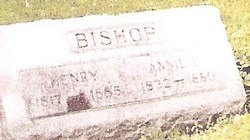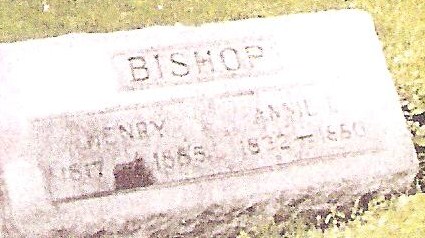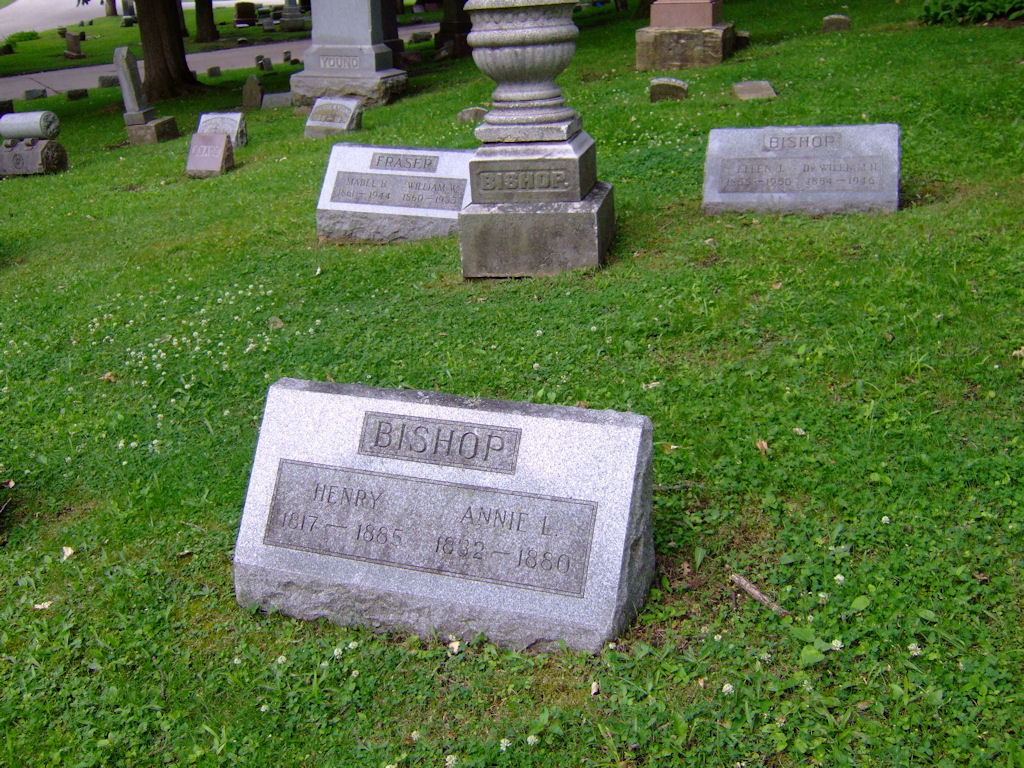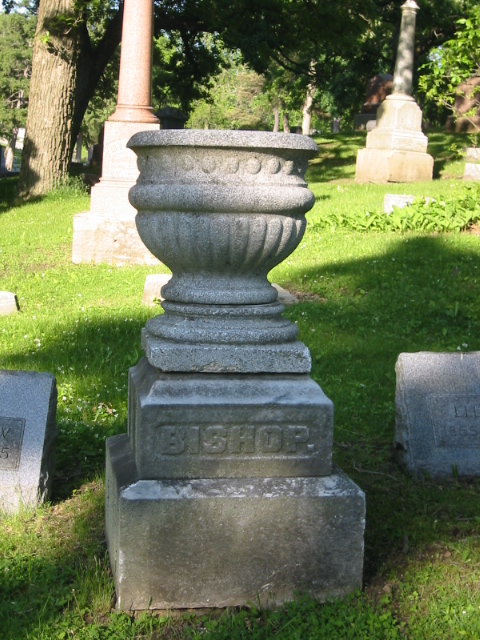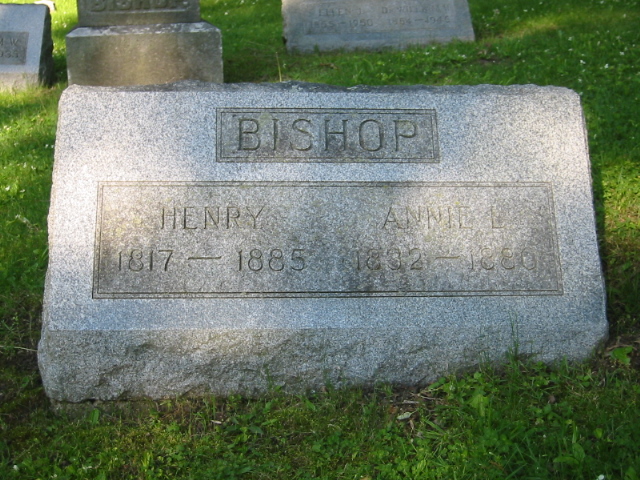There is no record of her birth in the Massachusetts Vital Records. Her marriage record indicates her name was listed as Ann S. Elmon rather than what her tombstone name indicates.
In two census records she was both Anne and Anna.
ANN LOVELL ELMORE
Married Henry Bishop.
Ann Lovell, third daughter of David W. and Mary A. Elmore, was born in Newton, Massachusetts, August 21, 1831, and died near Elgin, Illinois, February 21, 1880. As in the case of her sisters, she devoted a portion of her earlier years to teaching school, achieving gratifying results in this department.
In personal appearance, during the later years of her life, she may be described as not very tall, but of a full habit; with rich brown hair and handsome dark eyes, which always met each comer with a frank and kindly glance; features not strictly beautiful, but expression good; her face being lighted up by those bright, tender smiles which come from a loving heart.
The following tribute, which appeared in The Standard, Chicago, April 15, 1880, will give so complete an outline of her life, and the circumstances attendant upon her departure, that but little more need be added.
It was the hope of the writer, when he left for his Southern home, to have greeted her again in life; and no small part of the motive which inspired the compilation of this volume, grew out of the desire to place before her eyes, in form for preservation, at least some of her sweet girlhood's writings; but it was not permitted so to be. The home, of which she was the center and brightness, is now mute with voiceless sorrow; bereaved ones speak the name of the lost one in accents tender and low; and the pen which joyfully essayed to write somewhat of the biography of a useful, loving life, must now record a memorial to one who has passed from earthly scenes and trials to reap the eternal reward:
AT REST
MRS. ANN L. BISHOP
We are called upon to chronicle the death of Mrs. Ann L. Bishop, daughter of the late D. W. Elmore, A. M., and wife of Mr. Henry Bishop, which occurred at her former residence near Elgin, Illinois, on Saturday, February 21, 1880, her age being forty-eight years and six months.
Ann Lovell Elmore was born at Newton, Massachusetts, August 21, 1831. When she was but a child her father removed to Illinois, and settled on what afterwards was known as the Family Homestead, situated upon the beautiful banks of the Fox river, between Elgin and St. Charles. On December 27, 1853, she was united in marriage to Mr. Henry Bishop, her father performing the ceremony, and took up her home near Elgin, where she continued to reside during the remainder of her life; and where, in process of time, there gathered around her a family of six children, who are now left to learn the depth of bereavement which the loss of a loving, devoted mother entails.
She was of a gentle and affectionate disposition, and exerted an almost unlimited influence over those about her, controlling by the simple power of love, and an indwelling goodness, which made it sweet to do her any service. She possessed much of the poetical in her nature, and at an early age wrote in verse and somewhat in prose. Her writings of the former class were remarkably chaste and beautiful, and may truthfully be characterized as "Poems of the Heart." Her efforts in prose possess a fascination on account of their simplicity of style and diction, and remind one of those legends of lands across the sea, which so charmed our youthful days.
At the age of thirteen years she made a public profession of her faith in Christ, and united with the Baptist Church at Elgin, there keeping her membership, and remaining loyal to its interests, and prayerfully solicitous for its welfare, to the last.
There is something in the life of a true Christian mother—whose love for her home and her family is paramount to everything else, who makes this her world, her kingdom, and, with the unwavering devotion of woman's faith, grasps Heaven's choicest blessings for their sake, and lavishes the heart's rich treasure of affection upon them—something in this which words are too weak to describe, too meaningless to express. It is rather a power which the heart recognizes, and which stands as an unanswered and unanswerable argument to those who cynically ask if truth and unselfishness of purpose yet remain upon the earth. Every such life exemplifies the grandeur and moral sublimity of His teachings, who came "not to ministered unto, but to minister;" and—even when divested of all the additional charms in which the partial love of friends would embalm her memory—such, pre-eminently, was the life of our departed sister.
Changeless, unruffled; with faith deeply rooted in the everlasting love of her Savior; communing with Him hourly, as with a most endeared and trusted friend; resting upon his promises with a sweet and child-like assurance, born of the "perfect love" which "casteth out fear," and with it distracting doubt; as cheerful in the darkness as in the sunshine, because her faith reached far above the region of shadow; compelling all by the beauty of her quiet, earnest life and restful peace, to trace it back to its divine source; ere her departure she had the satisfaction of seeing a portion of her household resting in the consciousness of sins forgiven, and for the remainder there are treasured in Heaven—gone up as precious incense to the throne on high—a mother's life-time petitions, born of love, watered with tears, wrought out in unwavering trust, that they too shall be safe gathered into the fold.
For some years past failing health had prevented her from assembling with God's people, except at rare intervals. And while it was a source of regret to her that the more active duties of Christian service, which she would have counted it joy to perform, were denied, she also learned, the most difficult lesson, that,
"God loves patience. Souls that dwell in stillness,
Doing the little things, or resting quite,
May just as perfectly fulfill their mission;
Be just as useful in the Father's sight."
Her final illness was protracted, very painful, and called for long, patient endurance. But she was divinely sustained by Him in whom she had so long trusted; surrounded by loving brothers, sisters, and other friends, and the members of her own household; and ministered to by all, especially her eldest daughter, Mabel, upon whom the care of the home and the younger children must now so largely devolve.
Beautiful and quiet as the close of an autumn day, was her departure. The power of speech, which had been for a time withheld, was again restored, and to each tearful loved one, there was the farewell message of her whose voice should guide and soothe on earth no more. Life's work completed; earth's shadows receding; with the eternal city already opening up to her spiritualized vision, and her expectant ear catching the echo of the song of welcome as it floated down from the waiting company of the redeemed on high; as with the closing of the weary week the setting sun rested for a moment upon the western horizon in farewell to the day, her pure spirit peacefully passed from the region of sorrow and pain, to the inheritance of rest.
Sad is this bereavement to those left behind, and especially to her husband and children, who will come more and more to miss her self-forgetful care; yet, to her, how great the gain! Earthly suffering exchanged for heavenly glory; patient endurance, for exalted triumph; opportunity for doing, long denied, for the most exalted sphere of loving service; earth's thorny pathway, for which the feet had grown all too weary, for the golden pavement of the New Jerusalem, the new name, the song of the redeemed, and the everlasting presence of Him whom her soul so loved to contemplate--she has gone to be at rest.
At rest! o'er the dark rolling river,
Past death, and the power of the grave;
To the Father, the bountiful giver,
The spirits returned that he gave.
At rest! in the mansions of beauty,
Prepared for the souls of His love,
Who, faithful on earth to each duty,
Now reign with their Savior above.
A weary one's journey is ended;
A life that to others was blest;
By welcoming angels attended,
Gathered home--now, in safety, at rest.
T. J. E.
THE HAPPY LAND
[Written when in her thirteenth year.]
They say there is a distant land,
Where flowers, ne'er decay,
And forests dark, on ev'ry hand,
With gentle zephyrs play;
Where rich perfumes delight the sense;
Sweet songsters fill the air,
'Till wonder asks in rapture, whence
Cometh so much that's fair?
But there, such dreadful storms are known,
As ne'er are found in other zone;
And death comes also, there, they say,
And often takes many away.
There is a land quite near, they say,
Where people dwell with pride,
And of their boasted liberty
They speak both far and wide,
Where they obey no king's command,
Nor dread a monarch's frown;
And in that happy, happy land,
None ever wear the crown—
Yet here, despite this world-wide fame,
Regards,
Robert S. Elmore
The only purpose of starting is to finish, and while the projects we do are never really finished, they must ship. --Seth Godin, author
There is no record of her birth in the Massachusetts Vital Records. Her marriage record indicates her name was listed as Ann S. Elmon rather than what her tombstone name indicates.
In two census records she was both Anne and Anna.
ANN LOVELL ELMORE
Married Henry Bishop.
Ann Lovell, third daughter of David W. and Mary A. Elmore, was born in Newton, Massachusetts, August 21, 1831, and died near Elgin, Illinois, February 21, 1880. As in the case of her sisters, she devoted a portion of her earlier years to teaching school, achieving gratifying results in this department.
In personal appearance, during the later years of her life, she may be described as not very tall, but of a full habit; with rich brown hair and handsome dark eyes, which always met each comer with a frank and kindly glance; features not strictly beautiful, but expression good; her face being lighted up by those bright, tender smiles which come from a loving heart.
The following tribute, which appeared in The Standard, Chicago, April 15, 1880, will give so complete an outline of her life, and the circumstances attendant upon her departure, that but little more need be added.
It was the hope of the writer, when he left for his Southern home, to have greeted her again in life; and no small part of the motive which inspired the compilation of this volume, grew out of the desire to place before her eyes, in form for preservation, at least some of her sweet girlhood's writings; but it was not permitted so to be. The home, of which she was the center and brightness, is now mute with voiceless sorrow; bereaved ones speak the name of the lost one in accents tender and low; and the pen which joyfully essayed to write somewhat of the biography of a useful, loving life, must now record a memorial to one who has passed from earthly scenes and trials to reap the eternal reward:
AT REST
MRS. ANN L. BISHOP
We are called upon to chronicle the death of Mrs. Ann L. Bishop, daughter of the late D. W. Elmore, A. M., and wife of Mr. Henry Bishop, which occurred at her former residence near Elgin, Illinois, on Saturday, February 21, 1880, her age being forty-eight years and six months.
Ann Lovell Elmore was born at Newton, Massachusetts, August 21, 1831. When she was but a child her father removed to Illinois, and settled on what afterwards was known as the Family Homestead, situated upon the beautiful banks of the Fox river, between Elgin and St. Charles. On December 27, 1853, she was united in marriage to Mr. Henry Bishop, her father performing the ceremony, and took up her home near Elgin, where she continued to reside during the remainder of her life; and where, in process of time, there gathered around her a family of six children, who are now left to learn the depth of bereavement which the loss of a loving, devoted mother entails.
She was of a gentle and affectionate disposition, and exerted an almost unlimited influence over those about her, controlling by the simple power of love, and an indwelling goodness, which made it sweet to do her any service. She possessed much of the poetical in her nature, and at an early age wrote in verse and somewhat in prose. Her writings of the former class were remarkably chaste and beautiful, and may truthfully be characterized as "Poems of the Heart." Her efforts in prose possess a fascination on account of their simplicity of style and diction, and remind one of those legends of lands across the sea, which so charmed our youthful days.
At the age of thirteen years she made a public profession of her faith in Christ, and united with the Baptist Church at Elgin, there keeping her membership, and remaining loyal to its interests, and prayerfully solicitous for its welfare, to the last.
There is something in the life of a true Christian mother—whose love for her home and her family is paramount to everything else, who makes this her world, her kingdom, and, with the unwavering devotion of woman's faith, grasps Heaven's choicest blessings for their sake, and lavishes the heart's rich treasure of affection upon them—something in this which words are too weak to describe, too meaningless to express. It is rather a power which the heart recognizes, and which stands as an unanswered and unanswerable argument to those who cynically ask if truth and unselfishness of purpose yet remain upon the earth. Every such life exemplifies the grandeur and moral sublimity of His teachings, who came "not to ministered unto, but to minister;" and—even when divested of all the additional charms in which the partial love of friends would embalm her memory—such, pre-eminently, was the life of our departed sister.
Changeless, unruffled; with faith deeply rooted in the everlasting love of her Savior; communing with Him hourly, as with a most endeared and trusted friend; resting upon his promises with a sweet and child-like assurance, born of the "perfect love" which "casteth out fear," and with it distracting doubt; as cheerful in the darkness as in the sunshine, because her faith reached far above the region of shadow; compelling all by the beauty of her quiet, earnest life and restful peace, to trace it back to its divine source; ere her departure she had the satisfaction of seeing a portion of her household resting in the consciousness of sins forgiven, and for the remainder there are treasured in Heaven—gone up as precious incense to the throne on high—a mother's life-time petitions, born of love, watered with tears, wrought out in unwavering trust, that they too shall be safe gathered into the fold.
For some years past failing health had prevented her from assembling with God's people, except at rare intervals. And while it was a source of regret to her that the more active duties of Christian service, which she would have counted it joy to perform, were denied, she also learned, the most difficult lesson, that,
"God loves patience. Souls that dwell in stillness,
Doing the little things, or resting quite,
May just as perfectly fulfill their mission;
Be just as useful in the Father's sight."
Her final illness was protracted, very painful, and called for long, patient endurance. But she was divinely sustained by Him in whom she had so long trusted; surrounded by loving brothers, sisters, and other friends, and the members of her own household; and ministered to by all, especially her eldest daughter, Mabel, upon whom the care of the home and the younger children must now so largely devolve.
Beautiful and quiet as the close of an autumn day, was her departure. The power of speech, which had been for a time withheld, was again restored, and to each tearful loved one, there was the farewell message of her whose voice should guide and soothe on earth no more. Life's work completed; earth's shadows receding; with the eternal city already opening up to her spiritualized vision, and her expectant ear catching the echo of the song of welcome as it floated down from the waiting company of the redeemed on high; as with the closing of the weary week the setting sun rested for a moment upon the western horizon in farewell to the day, her pure spirit peacefully passed from the region of sorrow and pain, to the inheritance of rest.
Sad is this bereavement to those left behind, and especially to her husband and children, who will come more and more to miss her self-forgetful care; yet, to her, how great the gain! Earthly suffering exchanged for heavenly glory; patient endurance, for exalted triumph; opportunity for doing, long denied, for the most exalted sphere of loving service; earth's thorny pathway, for which the feet had grown all too weary, for the golden pavement of the New Jerusalem, the new name, the song of the redeemed, and the everlasting presence of Him whom her soul so loved to contemplate--she has gone to be at rest.
At rest! o'er the dark rolling river,
Past death, and the power of the grave;
To the Father, the bountiful giver,
The spirits returned that he gave.
At rest! in the mansions of beauty,
Prepared for the souls of His love,
Who, faithful on earth to each duty,
Now reign with their Savior above.
A weary one's journey is ended;
A life that to others was blest;
By welcoming angels attended,
Gathered home--now, in safety, at rest.
T. J. E.
THE HAPPY LAND
[Written when in her thirteenth year.]
They say there is a distant land,
Where flowers, ne'er decay,
And forests dark, on ev'ry hand,
With gentle zephyrs play;
Where rich perfumes delight the sense;
Sweet songsters fill the air,
'Till wonder asks in rapture, whence
Cometh so much that's fair?
But there, such dreadful storms are known,
As ne'er are found in other zone;
And death comes also, there, they say,
And often takes many away.
There is a land quite near, they say,
Where people dwell with pride,
And of their boasted liberty
They speak both far and wide,
Where they obey no king's command,
Nor dread a monarch's frown;
And in that happy, happy land,
None ever wear the crown—
Yet here, despite this world-wide fame,
Regards,
Robert S. Elmore
The only purpose of starting is to finish, and while the projects we do are never really finished, they must ship. --Seth Godin, author
Family Members
Advertisement
Advertisement
